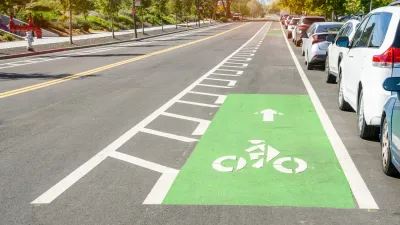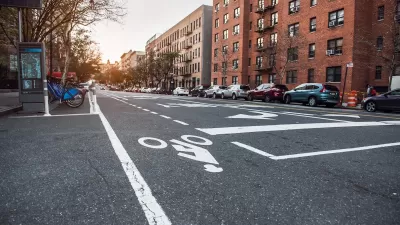The city will now require its department of transportation to consider bike and pedestrian facilities when planning new projects or improvements.

The Cincinnati City Council approved a Complete Streets policy for the city, signaling a “historic shift” in how the city designs its roads and codifying the imperative to consider pedestrians and cyclists. As Chris Wetterich reports in the Business Journals, the policy requires the city’s transportation department to “consider how to add new street features when they rehabilitate a street, add new traffic lights or other safety measures or make improvements for pedestrian safety.”
According to Councilman Mark Jeffreys, “For 75 plus years, we designed streets and thought first (about) cars – how fast can we get cars through? Speed was more important. This flips it. We should be designing streets for people.”
For each street it changes, the city’s transportation department will have to issue a report showing how many miles of new bike facilities it has installed, the number of linear feet of new, repaired or widened sidewalks, traffic calming measures, safety improvements, comfort enhancements and the number of projects in each neighborhood.
Earlier this year, Cincinnati ended parking requirements in the West End neighborhood, citing complaints from local businesses that favored removing parking to make room for other amenities.
FULL STORY: Cincinnati plans to make room for more bikes, pedestrians, transit on streets

Planetizen Federal Action Tracker
A weekly monitor of how Trump’s orders and actions are impacting planners and planning in America.

Maui's Vacation Rental Debate Turns Ugly
Verbal attacks, misinformation campaigns and fistfights plague a high-stakes debate to convert thousands of vacation rentals into long-term housing.

Restaurant Patios Were a Pandemic Win — Why Were They so Hard to Keep?
Social distancing requirements and changes in travel patterns prompted cities to pilot new uses for street and sidewalk space. Then it got complicated.

In California Battle of Housing vs. Environment, Housing Just Won
A new state law significantly limits the power of CEQA, an environmental review law that served as a powerful tool for blocking new development.

Boulder Eliminates Parking Minimums Citywide
Officials estimate the cost of building a single underground parking space at up to $100,000.

Orange County, Florida Adopts Largest US “Sprawl Repair” Code
The ‘Orange Code’ seeks to rectify decades of sprawl-inducing, car-oriented development.
Urban Design for Planners 1: Software Tools
This six-course series explores essential urban design concepts using open source software and equips planners with the tools they need to participate fully in the urban design process.
Planning for Universal Design
Learn the tools for implementing Universal Design in planning regulations.
Heyer Gruel & Associates PA
JM Goldson LLC
Custer County Colorado
City of Camden Redevelopment Agency
City of Astoria
Transportation Research & Education Center (TREC) at Portland State University
Jefferson Parish Government
Camden Redevelopment Agency
City of Claremont





























